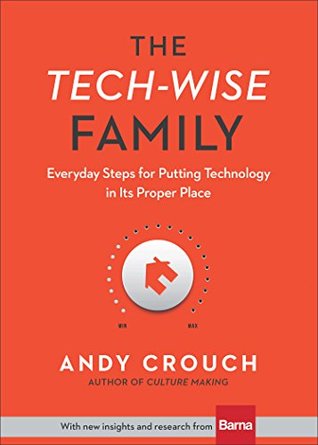More on this book
Community
Kindle Notes & Highlights
by
Andy Crouch
Read between
January 29 - February 7, 2024
Technology is in its proper place when it helps us bond with the real people we have been given to love.
Technology is in its proper place when it starts great conversations.
Technology is in its proper place when it helps us take care of the fragile bodies we inhabit.
Technology is in its proper place when it helps us acquire skill and mastery of domains that are the glory of human culture
Technology is in its proper place when it helps us cultivate awe for the created world we are part of and responsible for stewarding
Technology is in its proper place only when we use it with intention and care.
We are continually being nudged by our devices toward a set of choices. The question is whether those choices are leading us to the life we actually want. I want a life of conversation and friendship, not distraction and entertainment; but every day, many times a day, I’m nudged in the wrong direction. One key part of the art of living faithfully with technology is setting up better nudges for ourselves.
The most powerful choices we will make in our lives are not about specific decisions but about patterns of life: the nudges and disciplines that will shape all our other choices.
The first and deepest is to choose character—to make the mission of our family, for children and adults alike, the cultivation of wisdom and courage.
The second is to shape space—to make choices about the place where we live that put the development of character and creativity at the heart of our home.
the third is to structure time—to build rhythms into our lives, on a daily, weekly, and annual basis, that make it possible for us to get to know one another, God, and our world in deeper and deeper ways.
Ten Tech-Wise Commitments 1 We develop wisdom and courage together as a family. 2 We want to create more than we consume. So we fill the center of our home with things that reward skill and active engagement. 3 We are designed for a rhythm of work and rest. So one hour a day, one day a week, and one week a year, we turn off our devices and worship, feast, play, and rest together. 4 We wake up before our devices do, and they “go to bed” before we do. 5 We aim for “no screens before double digits” at school and at home. 6 We use screens for a purpose, and we use them together, rather than using
...more
For one, we discover what fools we are. No matter how big your house, it’s not big enough to hide your foolishness from people who live with you day after day.
In our families we see the consequences of all that misunderstanding. Our busyness, our laziness, our sullenness, our short tempers, our avoidance of conflict, our boiling-over conflicts—living in a family is one long education in just how foolish we can be, children and adults alike.
a second amazing thing happens in families at their best. Our foolishness is seen and forgiven, and it is also seen and loved.
And even though it’s incredibly hard simply to know what we should do, it’s even harder to actually act on what we know we should do. Because almost all the time, the most faithful, the most loving, and the wisest thing to do is scary, hard, and painful—even, in some ways, dangerous.
We need people who know us and the complexities and difficulties of our lives really well—so well that we can’t hide the complexity and difficulty from them. And we need people who love us—who are unreservedly and unconditionally committed to us, our flourishing, and our growth no matter what we do, and who are so committed to us that they won’t let us stay the way we are.
The church too was a household—a gathering of related and unrelated persons all bound together by grace and the pursuit of holiness.
If our families are to be all that they are meant to be—schools of wisdom and courage—they will have to become more like the church, households where we are actively formed into something more than our culture would ask us to be.
And if our churches are to be all they are meant to be, they will have to become more like a family—household-like contexts of daily life where we are all nurtured and developed into the persons we are meant to be and can become.
Technology is good at serving human beings. It even—as in medical or communication technology—saves human lives. It does almost nothing to actually form human beings in the things that make them worth serving and saving.
will have to teach our children, from early on, that we are not here as parents to make their lives easier but to make them better.
nothing matters more to our family than creating a home where all of us can be known, loved, and called to grow.
Find the room where your family spends the most time and ruthlessly eliminate the things that ask little of you and develop little in you.


